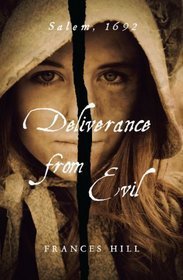Book review: Deliverance from Evil, by Frances Hill
 The Salem witch trials have become such a fixture in American history that most readers will already know the who, what, when, and where about the subject. What's missing is the how and the why. In this fictional dramatization by Frances Hill, a British historian who has written several nonfiction books about the events, the cause isn't mass hysteria or ergot poisoning, as others have posited, but vengeance and simple malice.
The Salem witch trials have become such a fixture in American history that most readers will already know the who, what, when, and where about the subject. What's missing is the how and the why. In this fictional dramatization by Frances Hill, a British historian who has written several nonfiction books about the events, the cause isn't mass hysteria or ergot poisoning, as others have posited, but vengeance and simple malice. The novel opens not in Massachusetts proper but on the Maine frontier, a "devilish region full of Baptists and Quakers," a place where departures from Puritan doctrine are tolerated but whose villages are being burned and destroyed in Indian raids. George Burroughs, the Harvard-educated former pastor of Salem Village and the beloved father of seven children, barely escapes the attack on the settlement at York with a young woman, Mary Cheever, who loses her father to the violence.
Once they reach Wells, the surviving settlers regroup and decide whether to move back south for safety. Meanwhile, in Salem Village, a children's fortune-telling game inspired by "slave magic" spirals out of control, with young Betty Parris's terrified fits and nightmares motivating others less innocent to pretend the same. Village leader Thomas Putnam sees his chance to even old scores, inciting the "afflicted girls" to point fingers and claim they're being harmed by witches. Grudges over lost inheritances, land disputes, long-standing jealousies… all of these things fuel Putnam's ruthless plan to take revenge on those who wronged him and his supporters.
Women (and a few men) accused by the girls of devilish harm are seized, examined, and imprisoned. The witch-hunting frenzy so obsesses the people that even pious, respected matrons like elderly Rebecca Nurse are charged based on "spectral evidence." The long arm of the law, such as it is, even extends north to George Burroughs, whose money disputes with the men of Salem Village still fester, years after his departure.
The plot proceeds methodically, laying out events from January through August of 1692 as they occurred, and the deliberate pacing takes a while to catch at the emotions. The scope is vast, moving from the Putnam household to Judge Hathorne's merciless courtroom to the Burroughs clan in Maine. While the events are terrifying, it's difficult at first to feel attachment to the characters, most of whom are cruel, cold-hearted people. Eventually the focus zooms in more closely on George and Mary, who fall in love and wed, and they emerge as worthy protagonists. Mary's hopeless quest to convince Salem's leaders of her husband's lack of guilt is commendable yet heartbreaking.
Hill's expertise enhances her account; nearly all of the characters are based in history. Most importantly, her interpretation is convincing, providing food for thought on how a deadly mob mentality can overtake reason and cause irreparable harm. The executions of blameless victims could have been prevented at several steps along the way, but those in charge ensured that they weren't. In contrast to the frontier wilderness of Maine and Massachusetts, which is vividly described, the village setting is accurate but utilitarian, serving merely as background for the tragedies on center stage.
Although it takes time to gain traction, this chilling account, unflinching in its telling, is a quality addition to the collection of novels about the injustice done at Salem.
Deliverance from Evil was published by Overlook in March in hardcover at $25.95, or $32.50 in Canada (320pp, including two-page author's note). The UK publisher is Duckworth (£6.99, paperback, forthcoming in June).
Published on March 15, 2011 09:49
No comments have been added yet.



